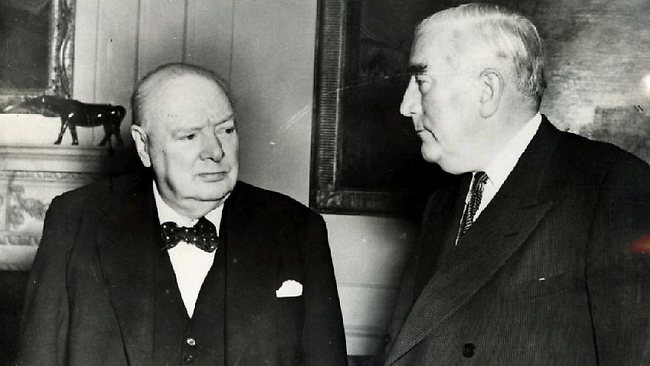It is now 50 years since the death of Sir Winston Churchill and television and radio schedules during January in the UK, along with numerous special edition newspapers, abounded with commemorative programmes to mark this anniversary. It has been stated by many people that Churchill’s funeral was an occasion that they would never forget and I include myself amongst their number. The sheer scale, grandeur and emotion of his funeral left me, even as a boy, in no doubt that I was witnessing the passing of a truly great man.
Churchill’s death, to many Britons, signified an end of empire, a final severance to a centuries old past of imperial grandeur. A time of pith helmets, when the union flag flew over areas of Africa and Asia and Britons knew that they were a part of the greatest empire the world had ever seen. In truth, much of this was an illusion, a view of the past through rose-tinted spectacles by people of a certain age who were effectively traumatised by the passing of the British Empire. Who were still troubled by the humiliation of Suez, the Profumo scandal and the economic decline of a once great nation that was now effectively bankrupt. London may have started to swing, fuelled by the popular sounds and bright psychedelic colours of a new generation, but to an older generation, who still remembered the war, Britain’s future looked as cold and bleak as the January day on which Churchill was buried.
We mourned Churchill’s death as the passing of a great man, but we mourned the passing of an era also. A brief period of time, 1940-45, when a Victorian aristocrat had galvanised an already declining world power to stand alone against the forces of darkness and save civilisation from the abyss.
The fact was though that, even after the fall of France in 1940 and before Russia and America’s entry into the war, we were not actually alone. Yes, the British people, faced with the threat of imminent invasion from German forces now just a few miles across the channel, undoubtedly felt alone, but the dominions of the British Empire were also at war with Germany and the Axis forces, but frequently came under the sweeping euphemism of British forces.
Britain and France declared war on Germany on September 3rd 1939, on that same evening the Australian Prime Minister, Robert Menzies, broadcast to his nation, announcing his “melancholy duty to inform you, officially that, in consequence of a persistence by Germany in her invasion of Poland, Great Britain has declared war on her, and that, as a result, Australia is also at war”.
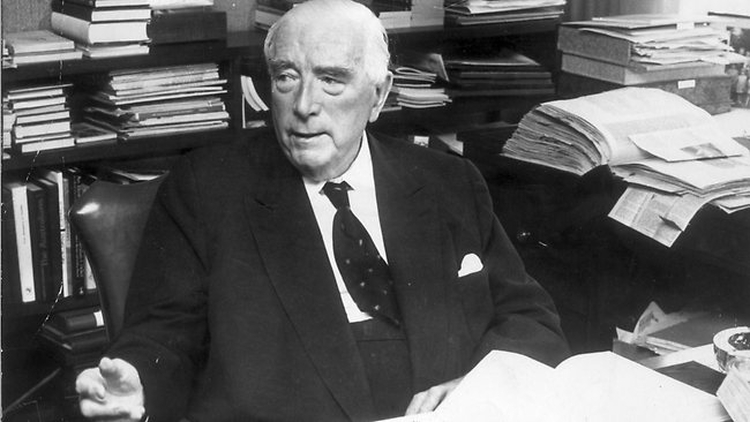
Menzies headed a minority United Australia Party government, which depended on the support of the Country Party for its survival and it was only when parliament met later that week that Menzies’ pledge of support to Britain could be ratified. Both Earle Page, the leader of the Country Party and John Curtin, the leader of the opposition Labor Party, pledged their support to Menzies. Not a single member questioned the correctness of the assertion that Australia was part of Britain’s declaration of war. Nor did anyone query Menzies view that he could appeal for the nation’s support “because we are all Australians and British citizens”.
Although Menzies was not dealing with Churchill at this stage of the war, the assertion that Australia and Britain were inextricably linked by the bonds of empire must have rankled with many ordinary citizens who still vividly remembered the carnage of the Great War, especially Churchill’s Gallipoli campaign of 1915. Some 9,000 ANZAC soldiers met their deaths in a doomed mission that had planned to ultimately capture Constantinople and none of it of course was in the defence of Australia. As Paul Keating, a later Prime Minister of Australia, wrote: “The truth is that Gallipoli was shocking for us. Dragged into service by the imperial government in an ill-conceived and poorly executed campaign, we were cut to ribbons and dispatched.”
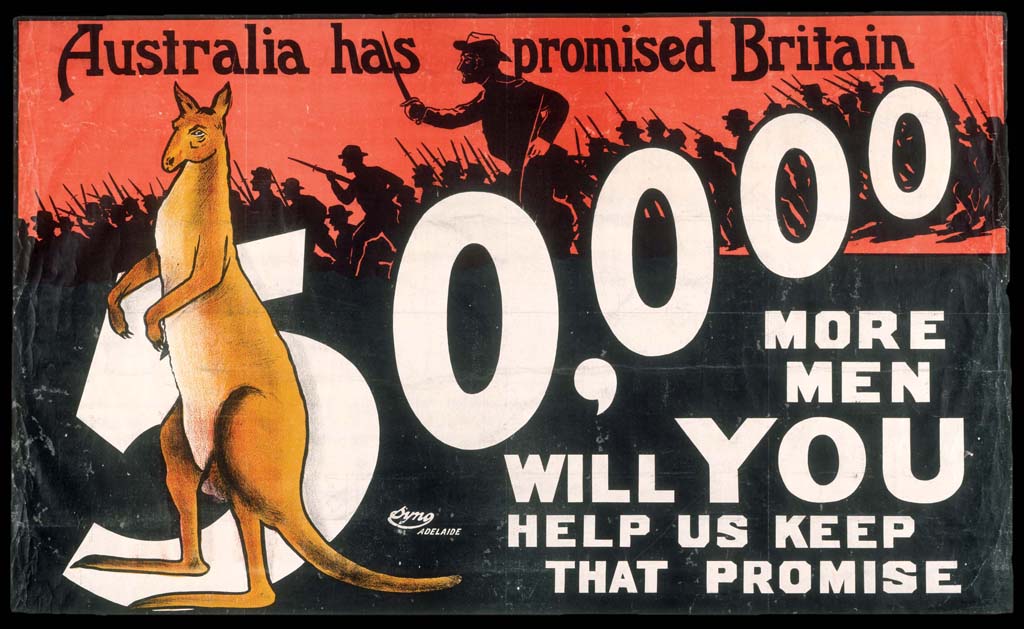
Whilst Australian enlistment drives (perhaps propaganda would describe it better) for WWI focused on a loyalty to Britain, those of WWII gave primary consideration to the defence of Australia. A National Security Act was passed in September of 1939 and a volunteer military force was established, immediately becoming known as the 2nd Australian Imperial Force. Menzies did not immediately offer Australian troops to Britain however, as he remained uneasy about Japan’s intentions in the Pacific and regarded Britain’s defence of Singapore – a key element in safeguarding an area of the Pacific that was of concern to the defence of Australia – as inadequate. This justifiably cautious approach was made redundant, however, when an offer of troops to help Britain from the New Zealand government was matched on behalf of the Australian government by Richard Casey, Menzies’ minister for supply and development, who was already in London discussing wartime co-operation between Australia and Britain. This injudicious offer was further compounded when Britain, without any further consultation with Menzies, immediately dispatched shipping to Australia with the express purpose of transporting Australian troops to Egypt for training.
Privately Menzies was furious with Britain for what he regarded as a “quite perceptible disposition to treat Australia as a colony”. In public, however, he had no choice but to support a decision he disagreed with – namely that of sending Australian troops overseas.
In May 1940 Winston Churchill took over the position of British Prime Minister from Neville Chamberlain and things were set to get a whole lot worse for Menzies. He flew to Britain in January 1941, but due to several stop-overs did not actually arrive until the 20th February (the first time an Australian Prime Minister had journeyed overseas by aeroplane), and met with Churchill, ostensibly to discuss the weakness of Singapore’s defences. Churchill soon broached the subject of seeking to use Australian soldiers in a proposed campaign to defend Greece from German invasion and found Menzies’ cautious approach to the matter irksome. Menzies further antagonised Churchill by meeting with Eamon de Valera, the President of the Irish Free State in a well-intentioned but naive attempt to end Irish neutrality in the war.
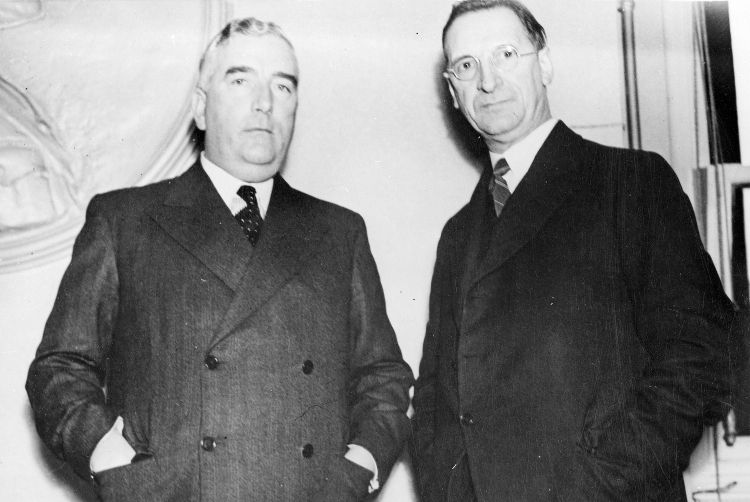
Despite his misgivings, Menzies gave his approval for the ill-fated Greek campaign, ultimately being seduced by Churchill’s combination of persuasive oratory, hectoring and an obligation of duty. Perhaps he viewed the fact that co-operation in this commitment of Australian troops would assist him in securing a likewise increased commitment from Britain in safeguarding the defence of Singapore? He evidently didn’t appreciate the calibre of politician he was now dealing with. Churchill, with the blitz still in progress and the threat of German invasion not yet perceivably passed, promised only to keep Australia’s concerns in mind. In Churchill’s mind the defence of Britain was his overriding priority and, with Japan yet to show her hand in the Pacific, he gave scant regard to diplomatic niceties when it came to the views and opinions of the so-called dominions.
The attempt to stop Greece falling into German hands in 1941 was a disaster, with it being noted that the troops were retreating from the moment they arrived. Why then, with the war going so badly on so many fronts, did Churchill seek to defend Greece at such a time? Graham Freudenberg wrote: “Greece was the only place in the world where he could fight the Germans and impress the Americans”. Further adding that General Thomas Blamey, who had to run the three-week fiasco, said: “we were told that the landing was tied up with the Lease and Lend Act in the US: if we didn’t come to the aid of Greece, the act would not be passed. What is a gesture to the politicians is death to us”. Both of these viewpoint are rather cynical and harsh as Britain was obliged to assist Greece by the Declaration of 1939, which promised to provide all available support in the event of any threat against Greek independence. Despite the fact, however, that the British inspired campaign in Greece (led by Henry Maitland Wilson) involved mainly ANZAC soldiers who sustained heavy casualties, with many men also being taken prisoner – resulting in the 6th Australian and the New Zealand 2nd Divisions having to be rebuilt – it was still classed as a “…poor performance of the British Army in Greece…”. A poor performance certainly, but not by the ordinary soldiers, many of whom gave their lives fighting in this ill-conceived action.
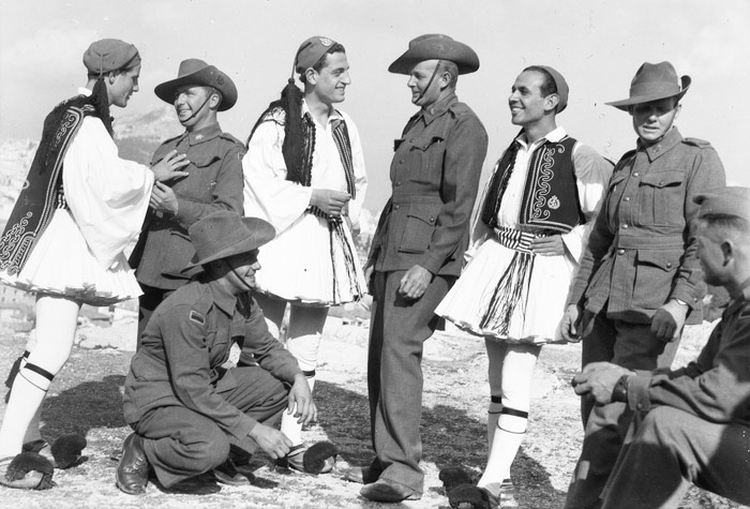
Being held to be at least partly responsible for this disaster and also being unable to deliver the national all-party government that increasing members of coalition and press critics alike desired, Menzies’ position as Prime Minister was becoming untenable. With a deteriorating war situation it was proposed Menzies should return to Britain to represent Australia’s interests in the British War Cabinet, but this idea was vetoed by the Labor Party and on 29th August 1941, Robert Menzies resigned as Prime Minister. Initially replaced by Arthur Fadden, his coalition government lasted only a month and on the 7th October 1941 John Curtin became Australia’s new Prime Minister.
Churchill was to find Curtin somewhat harder to manoeuvre than Menzies, although he still had a propensity to “borrow” commonwealth troops without seeing any necessity in informing their respective governments representatives until after the event, paying scant regard to The Balfour Declaration of 1926. Curtin tried, with mixed success, to remind him that Australia had its own strategic needs. Churchill’s viewpoint was that the Australian government had a duty to “study their own position with concentrated attention” but, as he later said, “we had to try to think for all…observing a true sense of proportion in world strategy”. In other words, the grand strategy warranted primacy, notwithstanding the seriousness of the parochial peril.
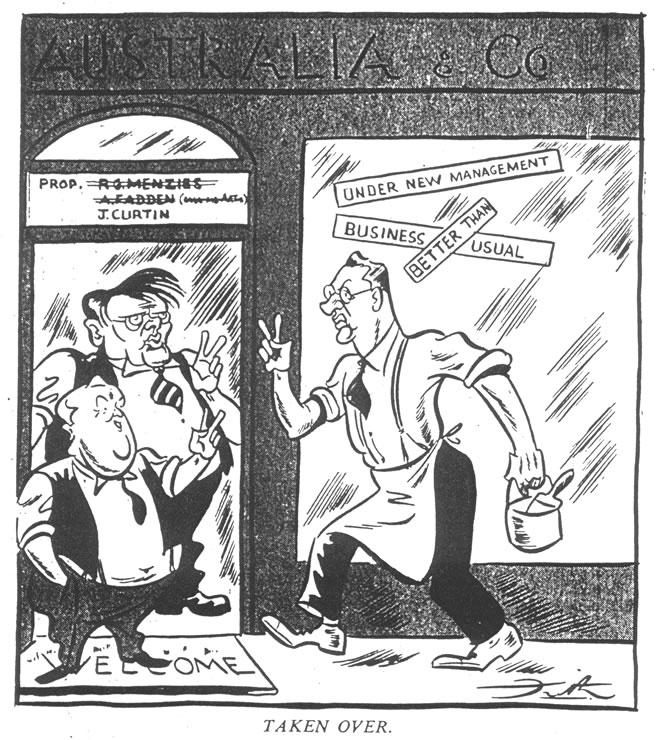
Curtin and Churchill continued to clash over many issues, not least the defence of Singapore, as Curtin knew that Churchill’s guarantees were either unenforceable or rapidly becoming unenforceable and the events of December 7th 1941 were set to bring matters to a head.
With the Japanese attack on Pearl Harbor now bringing America into the war, Churchill, in a meeting with Roosevelt, the American President, managed to secure a “Germany first” strategy with his new wartime ally, which gave a priority to defeating Germany and the European Axis forces ahead of Japan.
Curtin felt that this left Australia out in the cold and wrote to Churchill stating that “our chiefs of staff are unable to see anything in these proposals except the endangering of our safety”. The fact that the British government ultimately transferred Australian troops to Burma in February 1942, rather than returning them to Australia at this perilous time, added further to Curtin’s perceptions of isolation and became the subject of many heated exchanges between Australia and Britain. This series of correspondence between Curtin and Churchill became known in many circles as “the cablegram war” or “cable war” and is credited, by some, as the catalyst that heralded a new Australian foreign policy.
Over Christmas 1941, Curtin turned to America for help, forsaking the covenants of empire and placing Australia’s interests to their appropriate point of primacy.
Curtin’s communication to Roosevelt changed the course of Australian foreign policy stating “I make it quite clear that Australia looks to America, free of any pangs as to our traditional links or kinship with the United Kingdom…Australia can go and Britain can still hold on. We are, therefore, determined that Australia shall not go and we shall exert all our energies towards shaping of a plan, with the United States as its keystone, which will give our country some confidence of being able to hold out until the tide of battle swings against the enemy”.
Churchill was, naturally enough, not impressed by this and saw it as a gift to German and Japanese propaganda and an impertinent intervention by a colonial politician who did not truly represent his own country. Furthermore he regarded it as an unwarranted assertion of Australian independence; a weakening of the unity of the empire; an ill-timed exposure of the bankruptcy of three decades of British far-eastern strategy; an affront to his honour as the man who had given his pledged word about the rescue of kith and kin; an insult to the efforts that even now he was making on their behalf; a competitive bid for American aid; a threat to the “beat Hitler first” strategy; and an infringement of his monopoly with Roosevelt as the voice of the empire.
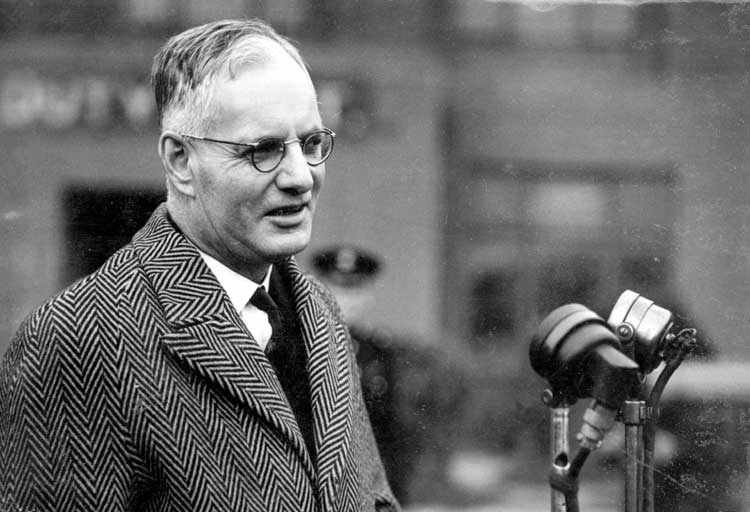
To state that Churchill was somewhat annoyed with Curtin and that relations between them had become strained by this point would obviously be an understatement of some magnitude.
With Australia declaring war on Japan before Britain, Curtin also proved that Australia was now capable of making its own foreign policy for its own interests rather than tagging along to the call of its imperial master. It could, of course, be argued that Curtin had merely sown the seeds of change in developing a less dependent nature of Australia’s relations with Britain merely by replacing them with America. A case of swapping masters rather than an establishment of a truly independent foreign policy. However Curtin’s actions are viewed, one thing was now certain; the time of the imperial period, when Britain, through its Foreign and Dominions Office, effectively made the foreign policies of Australia, was now over.
In 1942 Curtin’s government finally ratified the Statute of Westminster Act of 1931, involving legislative independence to self-governing dominions, and followed that with the ANZAC agreement of 1944. This furthered a growing fostering of a foreign policy that centred on geographical areas of importance to the needs of Australia, rather than the old imperial ties of empire. This was to increase still further with the ANZUS agreement of 1951 – with Bob Menzies now once again Prime Minister – which now also incorporated America into a regional defensive alliance with Australia and New Zealand.
Even Richard Casey’s view that “the foreign policy of Great Britain is the foreign policy of Australia” changed significantly and during the 1950’s he was responsible for the promotion of furthering links between Australia and many Asian countries, even communist China.
Churchill’s mixed relationship with Curtin is widely regarded as the start of a radical change in Australia’s relationship and foreign affairs with Great Britain, whilst Churchill himself is not held in very high esteem by many Australians, primarily for the disastrous military campaigns involving ANZAC forces that they hold him responsible for and is still thought of by many as no friend to Australia.
In regard to Curtin this viewpoint is somewhat overblown as, despite his many disagreements with Churchill, he always regarded Australia and its citizens to be primarily British.
Between the World Wars, Britain was Australia’s largest trading partner and overseas investor and Australia largely relied on the British government to represent Australia and her interests. The British Empire was therefore the structure which Australia was most engaged with and upon which it so fervently relied upon, rejoicing in its inclusion of. There could have been no way of knowing at this time that Britain had already seen her greatest days and that her empire was unsustainable, both commercially and militarily. Japan’s inclusion into the Second World War and the fall of Singapore soon highlighted the folly of placing near total dependency on a small island nation whose government was situated many thousands of miles away from the Pacific theatre of wartime operations. Under the circumstances it was both practical and inevitable that Australia would turn to the USA for assistance as they were in the best position, both militarily and geographically, to give aid to Australia, especially with the threat of a Japanese invasion of Australia’s northern coastline being viewed as a very real possibility.
From Churchill’s perspective Australian interests were but one part of a much bigger picture and, although his actions and rhetoric could at times indicate differently, he was not intent on punishing or ostracising Australia for “the troublesome attitudes of the colonies”.
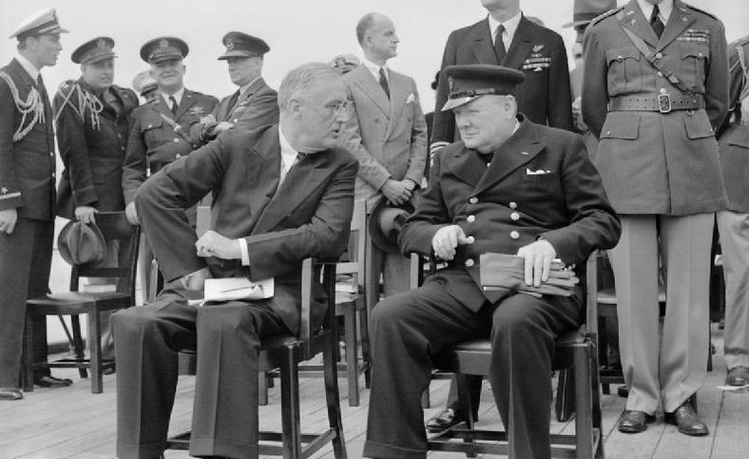
Churchill had wooed America with great skill long before its entry in the war and readily accepted the need for Britain to embrace the Soviets after Hitler invaded Russia in 1941. He was a detailed thinker and sought to prioritise the management of the whole war and if this led to differences of opinion with commanders or leaders with understandable parochial concerns, then so be it. In this regard Churchill’s priority was, certainly in the initial stages of his premiership, the survival of Britain and to this end there is undoubtedly some justifiable criticism that British interests were sometimes prioritised over those of the dominions.
That Churchill got his way in securing a “Germany first” pact with Roosevelt is testament to his skill and determination in pursuing a strategy that he saw as the best way of winning the war. This of course was a view that served Britain’s best course for winning the war, whilst Australians, especially the inhabitants of Darwin, who were bombed by the Japanese on February 19th 1942, probably reasoned that their most immediate danger came from Japan, not Germany.
Curtin emphasised the folly of relegating the Pacific theatre of wartime operations to that of a mere holding operation until Germany had been defeated, telling Churchill that “our minds are set on attack rather than defence”. Curtin also told Churchill that if Japan did invade, then bases in Australia, and possibly New Zealand, could be lost to the enemy and, whilst the defensive aspect was vital in order to hold these bases, they also provided the only platform from which Allied forces in the region could launch attacks against Japanese forces. Curtin found a strong ally in General MacArthur and ultimately succeeded in putting Australia’s case for reinforcements and a greater share of resources for the south-west Pacific area. This was partly due to the fact that there was no established second front yet in Europe and also that Roosevelt could not over-ride pressures from the American public and Navy to avenge Pearl Harbor.
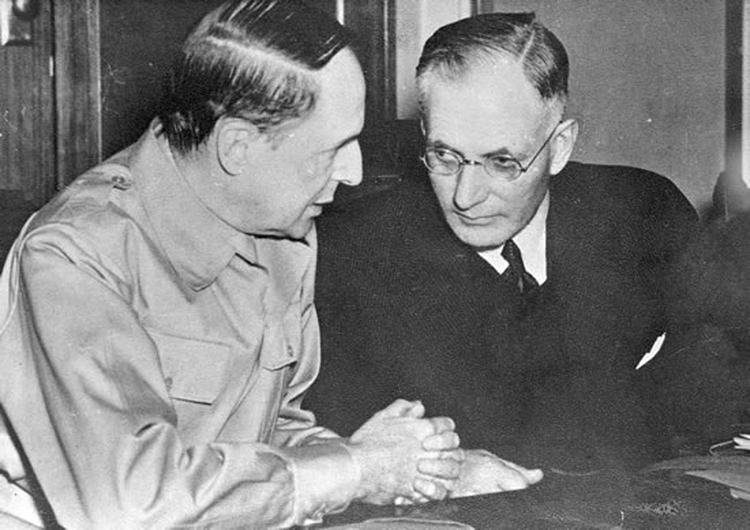
This assertion of Australian priorities came at a price as Curtin was now forced to push for conscription for overseas service in order to enable the conscript Citizen Forces, as well as the all-volunteer AIF, to advance and fight beyond Australian territory and ensure that Australia played the fullest part possible in the defeat of Japan.
In truth, the Second World War merely accelerated Australia’s independence from its colonial past. Britain’s influence on the world was already in decline and its dominance over a country several thousands of miles away could never be maintained, with Australian priorities during the Second World War fully emphasising this geographical absurdity.
There is no doubt that Menzies, Curtin and Churchill all took decisions in what they thought would be for the greater good in terms of the war and in regard to the welfare of their respective countries. In this latter regard Menzies was probably outmanoeuvred by Churchill into agreeing actions that, whilst they may have had a motivation for the greater good of the war effort, were potentially harmful to the interests of Australia.
Curtin proved less malleable and, much to Churchill’s chagrin, made a positive stand for Australian interests in looking to America for help after their inclusion in the war. This however was not done in a bid to sever ties with Britain in exchange for relations with America, but out of a basic necessity to bond with a country which had both the means and the ability to give direct aid to Australia. It also emphasised Curtin’s desire to have a greater say in the imperial matters of Australia.
He certainly had no desire to lead Australia away from Britain, but, understandably, felt that the days of Westminster telling Australia what to do without consultation were now at an end and that Australians should have a greater say in what was actually decided for Australia.
This situation would have occurred at some point regardless, but the war in the Pacific certainly speeded this process. British power in its far-eastern empire shrivelled, even after the victory of 1945, with the defeat of her forces in this region during 1941/42 being unforgettable. Britain was also virtually bankrupt and deeply in hock to the United States for its war-fighting equipment and even for food, and possessed neither the means or the will to cling onto an overseas empire, the separate countries of which now demanded to be free of their imperial linkages.
Curtin’s disagreements with Churchill undoubtedly emphasised a growing confidence in Australia’s desire to find her own voice on the world stage and certainly ended the outdated notion of Australia continually following Britain’s lead regarding foreign policy, but it was not the seismic change that many saw it as. The change was always inevitable, but the circumstances of war and Churchill’s outdated views regarding the role of Britain’s dominions, merely pushed Australia towards America sooner than it may otherwise had possessed the confidence to do so.

The 25th April will see the 100th anniversary of ANZAC day and this seems a good time to view Australia’s position in the world today. The 19th century was undoubtedly the British century for Australia, as was the first half of the 20th century and, to a lesser extent, it could be argued that the latter part of the 20th century was America’s time for Australia. Now is surely the time for Australia to finally take her place on the world stage in her own right, so that future generations can look back and proudly proclaim that the 21st century was Australia’s century.
Australia has long since shaken off the bonds of empire but retains links with Britain as an important and integral part of the Commonwealth and I see nothing contradictory in Australia maintaining this role whilst still asserting herself as a truly independent country.
As a Pom I do find it something of an anachronism that the queen of a small island nation many thousands of miles away is still Australia’s Head of State. This may be out of respect and/or some deference to the past, but does give the perception that Australians still lack total confidence in their country’s ability to stand for itself and the time is surely long overdue for this anomaly to be corrected.
Another thing that I don’t fully comprehend is the fact that Australians celebrate Australia Day on January 26th. This commemoration derives from the arrival of the British First Fleet in 1788 and is an event that Sydney council, back in 2011, voted for its official records to be changed in order to more accurately call this an “invasion” of Australia rather than the previous wording classing it as a “European arrival”. So why would Australians choose to celebrate this date? Despite the fact that the marking of this anniversary has diversified over the years there surely has to be a more appropriate date upon which to celebrate Australia’s emergence as a nation, other than a date which is now officially recognised as the invasion of Australia.
Australia has come a long way since its colonial past but still needs to have the confidence to take the final steps in establishing itself as a truly independent country.
Advance Australia Fair.
Primary Sources and Further Reading:
Forgotten Anzacs: The Campaign In Greece, 1941: Peter Ewer:Scribe Publications, 2008.
Churchill And Australia: Graham Freudenberg: Macmillan Publishers, 2008.
The Anzac Portal Website.
The Launch Of Churchill And Australia – 30 October 2008: Paul Keating.
National Archives Of Australia: Australia’s Prime Ministers.
Australian War Memorial Website: The Greek Campaign, 1941.
Australia’s War 1939-45: Edited By Joan Beaumont: Allen And Unwin, 1996.
Neil Kemp is a keen and passionate amateur historian and prize winning photographer who lives in Margate, on the North Kent coast in the United Kingdom. Before retiring he worked both with and at Margate Museum, overseeing budgets on a number of historical projects.

